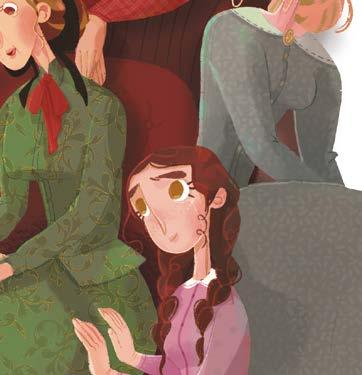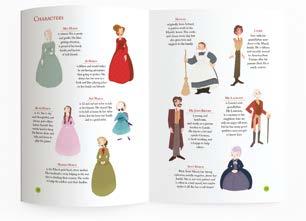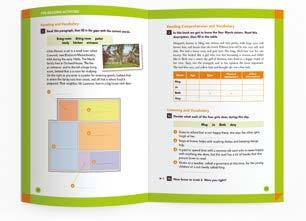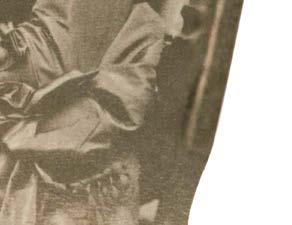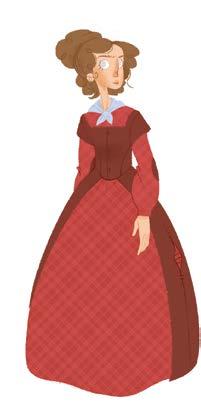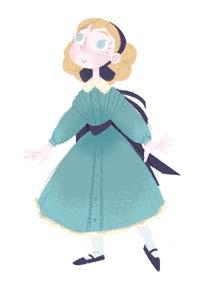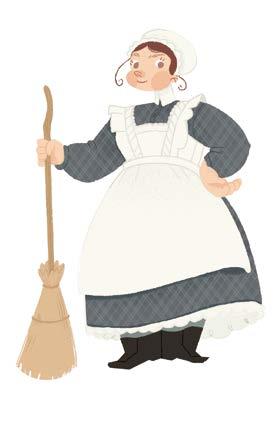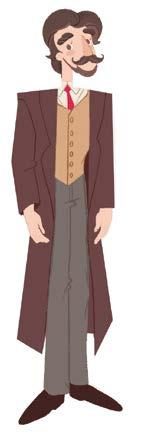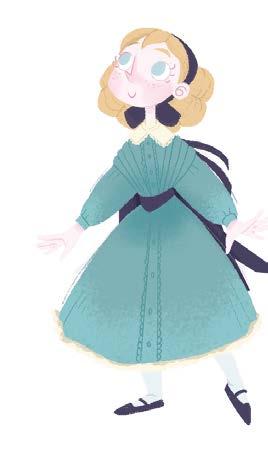Life Before
Little Women
Louisa May Alcott is one of the world’s best-loved authors of stories for children and young adults. Born in Germantown, now part of Philadelphia, USA, on November 29, 1832, the young Louisa loved adventure, and always had with her a pencil and notebook to write about what she saw around her.
From around 1500 for nearly 400 years, at least 12 million men, women and children from Africa were taken and sold as slaves (people who are not free). Most ended up in the USA and the Caribbean.
A Forward-Looking Family
Louisa was the second daughter of Amos Bronson Alcott and Abigail May, known as Abba. Her parents had modern ideas about education, women’s freedoms, and fought for the abolition of slavery – to make it illegal to own, buy and sell human beings.
“Far away there in the sunshine are my highest aspirations [dreams]. I may not reach them, but I can look up and see their beauty, believe in them, and try to follow where they lead.”
“I want to do […] something heroic or wonderful that won’t be forgotten after I’m dead. I don’t know what, but I’m on the watch for it and mean to astonish [surprise] you all someday.”
From an early age, Louisa May Alcott wanted to be remembered for doing something special – particularly unusual at a time when women had so few opportunities.
A Free Spirit
Louisa wrote:
“Running away was one of the delights [pleasures] of my early days”. One time, when she was six, she spent the day with some Irish children. As it got dark, her friends left and she “felt that home was a nice place after all, and tried to find it.”
Years later, Louisa wrote: “I still enjoy sudden flights [journeys] out of the nest [home] to look about this very interesting world, and then go back to report.”
Hours later she was found asleep with a dog on some steps, and next day “was tied to the arm of the sofa” to learn her lesson!
“My greatest pride is in the fact that I lived to know the brave men and women who did so much [to stop slavery].”
Louisa the Abolitionist
Following her parents, Louisa “became an Abolitionist at a very early age.” When she was four, she and her parents visited British abolitionist George Thompson in prison in Boston. She was later saved by “a colored boy” after she fell into a pond – both events had a strong effect on her.
Several European countries, but between 1660 and 1807 mostly Britain, were involved in buying and selling slaves. In 1806, Britain made a law to stop slavery, but some slavery continued until the 1870s.
slavery.
Abolitionists fought to stop
When Louisa received only $4, her parents were very angry and sent the money back to the place where she had worked.
The Problem of Money
Louisa May Alcott worried about money. Her family was full of love and warmth, but her parents were not good at making money. When she was nineteen, she went to work in the house of a rich family. She was badly paid, receiving only 4 dollars for seven weeks’ work.
In 1854, Louisa published her first book of short stories, Flower Fables. These were stories she had written for Emerson’s daughter.
Louisa used her bad experiences in stories published in a newspaper and a monthly magazine. She was beginning her career as a writer.
Louisa May Alcott born, Philadelphia, November 29, 1832 older sister Anna, born 1831; younger sisters, Elizabeth, born 1835, and Abigail, born 1840. Louisa was 26 when the family moved to Orchard House, Concord in 1858. Little Women is set in this old house built around 1700.
A Time of Sadness
Louisa’s older sister Anna was the model for Meg March, while Elizabeth was Beth and Abigail was Amy in the famous novel.
Louisa used stories from her life in her writing, but changed many details. When we meet the four March sisters at Orchard House in the novel, they are still children.
A few weeks before the family moved to Orchard House, Elizabeth died aged 22. That same year, Louisa couldn’t find a job and became depressed. Then two years later, her sister Anna got married, leaving only two sisters at home. It was a difficult time, but Louisa was starting to earn money from her writing.
For Christians, the soul is the part of a person that never dies. Here, Louisa uses it to mean “person”.
“Be comforted, dear soul! There is always light behind the clouds.”
Famous Friends
Orchard House became a lovely home for the Alcotts. Living near them were the famous writers Nathaniel Hawthorne, Ralph Waldo Emerson, and Henry David Thoreau. Emerson read Louisa’s work and encouraged her.
Louisa was starting to earn good money for her stories.
The Civil War
On April 12, 1861, the Union, states known as “the North” and including Louisa’s state of Massachusetts, went to war with 11 southern states, “the Confederacy”, to stop them increasing slavery. Louisa went to Washington to work as an army nurse, but had to come home after six weeks after she got very ill.
“Emerson remained my ‘Master’ while he lived, doing more for me […] than he knew, by the simple beauty of his life, the truth and wisdom [intelligence] of his books, the example of a great, good man […]”
The Civil War (April 1861–May 1865) began after Abraham Lincoln, who was against increasing slavery, became president in 1860. Over seven hundred thousand men died during the war.
Louisa wrote about her time as a nurse in letters home. These were published in a book in 1863 under a different name. She was paid $200. The book was a big success.
Ralph Waldo Emerson (1803–1882) was an American writer and philosopher. He wrote “To be yourself in a world that is [always] trying to make you something else is the greatest accomplishment [success].”
Characters
MEG MARCH
is sixteen. She is pretty and gentle. She likes getting attention, is proud of her lovely hands, and has lots of rich friends.
JO MARCH
is fifteen and would rather be out having adventures than going to parties. She always has her nose in a book and likes playing jokes on her family and friends.
AMY MARCH
BETH MARCH
is 13. She is shy and thoughtful, and always puts others before herself. She works hard to keep the house clean and tidy, and loves to play the piano.
is 12 and sad not to be as rich as her friends. She doesn’t like to be left at home by her older sisters, but she loves her family and is a good artist.
MARMEE MARCH
is the March girls’ kind, clever mother. Her husband is away helping in the war that is dividing their country. She works to help the soldiers and their families.
HANNAH originally from Ireland, is paid to work in the March’s house. She cooks and cleans every day, but also gives love and support to the family.
LAURIE lives with his grandfather next door to the March family. He is fifteen and recently moved to America from Europe after his parents died. He is rarely serious.
MR. LAURENCE is Laurie’s rich grandfather. Mr. Laurence, is a mystery to his neighbors who see only an angry old man, but he has many good qualities once you get to know him. is hard-working and and recently moved
MR. JOHN BROOKE is young and handsome, and works as a private teacher to Laurie. He knows a lot and speaks German, is hard-working and is happy to help others.
AUNT MARCH
Rich Aunt March has strong opinions, usually negative, about her family. She is not very patient and is often in a bad mood, but maybe under it all she has a soft heart?
Reading and Vocabulary
1 Read this paragraph, then fill in the gaps with the correct words.
living room dining room parlor study kitchen entrance
Little Women is set in a small town called Concord, near Boston in Massachusetts, USA during the early 1860s. The March family lives in Orchard House. This has an entrance, and to the left a large living room, behind that is a room for studying. On the right as you enter is a parlor for receiving guests, behind that is where the family eats their meals, and off that is where food is prepared. Their neighbor, Mr. Laurence, lives in a big house next door.
Reading Comprehension and Vocabulary
2 In this book we get to know the four March sisters. Read this description, then fill in the table.
Margaret, known as Meg, was sixteen and very pretty, with large eyes, soft brown hair, and hands that she loved. Fifteen-year-old Jo was very tall, and thin. She had a funny nose, and gray eyes. Her long, thick hair was her one beauty. She looked like a girl who was fast becoming a woman and didn’t like it. Beth was a sweet, shy girl of thirteen, who lived in a happy world of her own. Amy, was the youngest, and in her opinion the most important. She had blue eyes, and yellow hair and thought she was a fine lady.
3a Decide what each of the four girls does during the day. Meg Jo Beth Amy
1 Goes to school but is not happy there; she says the other girls laugh at her.
2 Stays at home; helps with washing dishes and keeping things tidy.
3 Is paid to spend time with a nervous old aunt who is never happy with anything she does, but the aunt has a lot of books that this person loves to read.
4 Works as a teacher, called a governess at this time, for the young children of a rich family called King.
3b Now listen to track 2. Were you right? 2
Vocabulary
4a Read this paragraph about life in New England in the 1860s.
During the 1800s, the USA was a country of people who had arrived from all over the world to live in the lands of the Native Americans. From the 1840s, large numbers of German immigrants arrived, looking for a better life, but they had a hard time finding work. At this time people with money traveled in carriages pulled by horses and had standing clocks in their homes that rang on the hour to give the time. These families paid people, called servants, to work for them in their houses. Homes were heated with open fires. Knowledge of medicine was improving, but doctors had few ways to help you if you got ill.
4b Read the definitions, then find the correct word/s in the text for each one below.
1 ______________________ wood or coal burned in a fireplace to keep a room warm a ‘car’ pulled by horses, could be open or closed
______________________ person who comes to live forever in another country
______________________ person paid to work in another person’s home to cook, wash, clean
______________________ knowledge of illnesses and how to make people well
______________________ tells you the time
4c Do you think life was good in 1860s USA? What was good and what was not so good?
Writing and Summarizing
5 Write a description of this book using what you know so far. Use full sentences.
Remember to include
• author
• where it is set
• when it is set
• main characters
• what you know about the family
• what everyday life is like for the people in the book
Listening – True or False
3 How does it compare to Christmas in the March family house? 3
6 Listen to track 3, then choose true (T) or false (F).
1 Mr. March writes from the war that he will be home after Christmas.
2 The girls decide to give their Christmas breakfast to a local family.
3 The two older girls get invited to a dance on New Year’s Eve.
4 Jo and Laurie dance together in a large room full of people. Speaking
7 Discuss in pairs.
1 What are the most important celebrations, like Christmas, where you live?
2 What do you do on this day/these days?
Chapter 1
A New Friend
2 Louisa knew what it was like to live without money as a child.
Beth always sees the good in everything and everyone.
The American Civil War began in 1861 and ended in 1865. The North beat the Confederacy, and this was the beginning of the end of slavery in the US.
Meg has a job teaching the youngest children of a rich local family called King.
“Christmas won’t be Christmas without any presents,” said Jo.
“Some girls have pretty things, while other girls have nothing,” said little Amy, sadly*.
“We’ve got Father and Mother, and each other,” said Beth.
“Yes, but Father is away at the war, and will not be back for a long time,” Jo said.
“I’m tired of teaching those children all day when I want to enjoy myself at home,” Meg said.
“My job is harder than yours,” said Jo. “Would you like to sit for hours with a nervous, old lady, who is never happy with anything you do?”
Beth’s greatest love is playing the piano.
“Washing dishes and keeping things tidy is the worst work in the world. My hands get so stiff* that I can’t play my piano well,” said Beth with a sigh*.
“It’s worse for me! You don’t go to school with unkind girls,” said Amy, “they laugh at my dresses, talk about how our father is poor, and tell me my nose isn’t nice.”
sadly in an unhappy way stiff that you cannot move easily sigh (here) long breath out, showing sadness
Everybody had a tear in their eye.
‘Papa’ is a name the girls call their father.
There were at least 2300 army chaplains helping the ‘North’. Most were men, but there was one woman, called Ella Elvira Gibson.
“Don’t you wish we had the money Papa lost when we were little, Jo? How happy and good we’d be, if we had no worries!” said Meg, who remembered better times.
“You said the other day you thought we were happier than the King children because they fight and worry all the time, even though they are rich,” said Jo.
“Well, I think we are. For though we do have to work, we have fun,” said Meg.
Jo immediately sat up, put her hands in her pockets.
The girls’ father is helping in the Civil War but is not fighting. He is a ’chaplain’ – a man of the church – helping soldiers with their worries and fears.
At this time, girls and women made a lot of clothes at home.
Meg’s full name is Margaret, Jo’s is Josephine, and Beth’s is Elizabeth. Amy is a full name.
“I hate to think I’ve got to grow up, and be Miss March, and wear long dresses!” said Jo, “It’s bad enough being a girl. I like boy’s games and work! I am so disappointed I am not a boy. And it’s worse than ever now, I want to go and fight with Papa. And I can only stay home.”
“Poor Jo! It’s too bad, but it can’t be changed. So you must try to be happy with making your name sound like a boy’s, and playing brother to us girls,” said Beth, putting her gentle hand on Jo’s head.
As readers like to know ‘how people look’, we will take this moment to describe the four sisters, knitting by the fire, while the December snow fell.
Margaret, known as Meg, was sixteen and very pretty, with large eyes, soft brown hair, and pretty
3
hands that she loved. Fifteen-year-old Jo was very tall, and thin. She had a funny nose, and gray* eyes that could be fierce*, funny, or thoughtful*. Her long, thick hair was her one beauty. She looked like a girl who was fast becoming a woman and didn’t like it. Beth was a sweet, shy girl of thirteen, who lived in a happy world of her own. Amy, was the youngest, and in her opinion the most important. She had blue eyes, and yellow hair and thought she was a fine* lady.
The clock rang. It was six o’clock. Mother would be home soon. Beth put a pair of slippers near the fire to warm, and they all stopped complaining to welcome her with happy faces.
“I’m glad to find you so happy, my girls,” said a voice at the door. It was Mrs. March. “How was today? I had so much to do, getting the boxes ready to send tomorrow. Has anyone called, Beth? How is your cold, Meg? Jo, you look tired. I’ve got something nice here,” she said, taking a paper from her pocket.
Jo said, “A letter from Father!”
They sat with their mother to hear their father’s letter. At the end he wrote. “Give the girls my love. A year seems very long to wait before I see my little women.”
Everybody had a tear in their eye at that.
Clocks at this time were large, and stood on the floor or a shelf; wrist watches became more common from 1910.
gray (UK spelling =) grey fierce strong and powerful thoughtful (adj.) thinking a lot about things fine (here) rich and fashionable
Mrs. March is working to help soldiers (and their families) fighting for the North, during the American Civil War. The family shares the letters Mr. March sends back from the war.
We understand the name of this novel.
This is a German surname – many people were coming to live in the USA from Germany at this time; Louisa May Alcott liked German people and their culture.
On Christmas day, when the girls went down for breakfast, their mother had news.
“Not far away is poor Mrs. Hummel with a little baby. Her oldest boy came to tell me they were hungry and cold. Will you give them your breakfast as a Christmas present?”
For a minute no one spoke, then Jo said, “I’m glad you told us before we started eating!”
“There‘s a hall where we can dance,” said Laurie.
When they got to the Hummel’s room it was cold and had broken windows. The Hummels were very happy to have the girls’ gifts of firewood and food. Back at home the March girls had a simple breakfast, but later that day their servant* Hannah called them to supper. When they saw the table, they were amazed. There was ice cream, cake and fruit.
“Old Mr. Laurence sent it,” said Mrs. March.
“The Laurence boy’s grandfather? But we don’t know him!” said Meg.
“Hannah told one of his servants you gave your breakfast to that poor family. He is a strange old gentleman*, but that pleased him and he sent you some treats*.”
A few days later, Meg called “Jo! Jo! Where are you?” with a paper in her hand. She found Jo reading in the attic. “Listen!” said Meg, “‘Mrs. Gardiner would be happy to see Miss Margaret and Miss Josephine at a dance on New Year’s Eve.’ Marmee* says we can go. You will be nice, won’t you?”
“I’ll be good!” said Jo.
On New Year’s Eve there was a lot of laughing and talking as the girls got ready. They looked good in their simple dresses, although Meg’s shoes were too tight, and Jo’s hairpins* were not comfortable.
servant person paid to work in another person’s home to cook, wash and clean gentleman polite word for ‘man’ treat special things to eat Marmee the name the March girls call their mother hairpins long thin pieces of metal (often with a pretty design) used to hold hair up on the head
This rich old man lives next door to the March family in a large, beautiful house.
Mr. Laurence lives with his grandson.
Jo has her own room at the top of the house – the attic – where she reads and writes.
Meg is reading an invitation written in polite language.
This is a party given by rich friends of Meg’s, with dancing and food.
Meg is worried. Jo doesn’t like dresses or parties, she prefers being outside or reading books.
At this time, women and girls wore their hair up. Only young girls had their hair down.
Hannah will bring them home because the party will end late. At this time, young women had to wait for young men to ask them to dance.
Jo meets
Mr. Laurence’s grandson. She has seen her young neighbor before but has not spoken to him.
“Have a good time!” said Mrs. March, as the sisters left. “I’ll send Hannah at eleven.”
At the party Meg was at her ease*, but no one came to talk to Jo. When the dancing began, Meg was asked immediately. Jo did not want to dance so she went into a small room but the ‘Laurence boy’ was already there.
“You live near us, don’t you?” asked Jo. “I’m Jo.”
“And I’m Laurie,” he said.
“Don’t you dance, Laurie?”
“Sometimes. I’ve been abroad, and don’t know how you do things here.”
“Abroad!” said Jo. “Oh! I love to hear about people’s travels.”
The Gardiners have a large entrance room, called a hall. These big rooms were built to show how rich a family was.
The Polka was an energetic dance, originally from Poland. During 1860–1865 it was the most popular dance in the US.
Laurie told her about his school in Switzerland. They talked until they felt like old friends.
“There’s a hall where we can dance and no one will see us,” said Laurie.
The hall was empty and they had a grand polka. When the music stopped, they sat on the stairs to rest and Meg arrived looking for her sister.
“I’ve hurt my foot with those shoes. I don’t know how I’m going to walk home.”
Laurie offered his grandfather’s carriage*, which had just arrived.
“Do you really want to leave so early?” asked Jo.
at her ease relaxed and happy carriage a ‘car’ pulled by horses, could be open or closed
“I always go early! Let me take you home. It’s on my way and it’s raining.”
With many thanks, they agreed.
“I feel like a fine young lady, coming back in a carriage,” said Meg, once they were home.
“I don’t believe fine young ladies enjoy themselves more than we do,” said Jo.
And I think she was quite right.
Sometimes in this novel, we hear the opinion of the writer.
Reading Comprehension – Multiple Choice
Choose the correct option to complete the sentence.
1 The four March sisters are complaining about their lives because…
A it’s Christmas when girls have pretty things.
B they don’t enjoy what they do during the day.
C they are nervous and miss their father.
2 When it was six o’clock the girls stopped complaining because…
A their mother was a fine lady.
B their mother would complain if she saw unhappy faces.
C they didn’t want their mother to see them unhappy.
3 The girls gave their Christmas breakfast to the poor family, but…
A they had to think about it for a moment.
B they had already started eating.
C afterwards they were hungry and cold.
4 Mr. Laurence sent the girls special Christmas food because…
A he knew how much Hannah wanted to give them a good Christmas.
B he wanted to give them a generous Christmas gift.
C the girls had been kind to people who were having a bad time.
5 Meg asks Jo about her behavior at the New Year’s Eve party because…
A she knows Jo doesn’t always behave as people expect.
B she wants everyone to see them dance nicely.
C she is worried about Jo’s hairpins and her own tight shoes.
6 Jo’s new friend Laurie suggests they dance in the hall because…
A he’s recently moved to America from Switzerland.
B they both enjoy dancing, but don’t like people watching them.
C he doesn’t know American culture very well.
Comparatives and Superlatives
1 Complete the sentences using words in the box in the comparative or superlative.
young old bad (x2) hard
Jo thinks her job is (1) than her sister Meg’s but Beth doesn’t agree. She says keeping the house clean and tidy is the (2) work in the world. Amy, who is 12 and the (3) of the four thinks her life is (4) than her sister’s because the girls at school are unkind to her. On Christmas day, the March family receives a visitor, it is Mrs. Hummel’s (5) son come to ask for help.
Questions and Question Tags
2 Questions are not only about finding out information. Use the prompts to write your own questions. Include tag questions, e.g. won’t you?, where necessary.
1 Jo wants Meg to imagine what her days are like with her nervous old aunt.
2 Marmee wants to find out from Beth if there have been any visitors to the house.
3 Meg wants to be sure Jo will behave nicely at the New Year’s Eve party.
4 Jo wants to let Laurie know that she knows he is her neighbor.
5 Jo wants to know if Laurie is being honest about leaving the party early.
Reading True or False and Gap Fill
Read the paragraph about the March and Laurence families, and decide if the following statements (1–6) are true (T) or false (F). Then write the words you used to make your decision. The first (0) has been done for you.
The first time the girls have any contact with old Mr. Laurence is when he sends them a delicious supper after hearing they’d been kind to a poor local family. Mrs. March describes Mr. Laurence as a strange gentleman and the girls are surprised by his gift because they’ve never met him. The first time one of the March girls meets Mr. Laurence’s grandson, Laurie, is at Mrs. Gardiner’s New Year’s Eve party, though they know him by sight because he lives next door. Jo is the first to speak to him and they quickly become friends. Jo learns that Laurie was at school in Switzerland, that he’s still unsure about how people do things in America, and that he loves dancing.
0 Mr. Laurence has never before communicated with the March girls. ✔
1 Mr. Laurence sends the girls food because he is worried they are hungry.
2 The girls are expecting a gift from Mr. Laurence.
3 Jo has not spoken to Laurie before but she recognizes him.
4 Laurie was at school in a different part of America.
5 Laurie is still getting used to life in America. The first time the girls have any contact with old Mr. Laurence.
4



